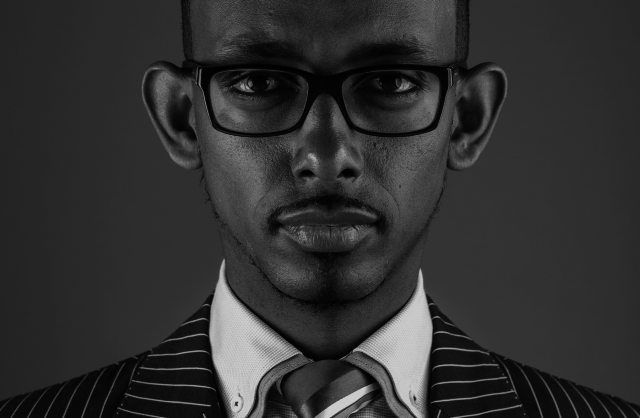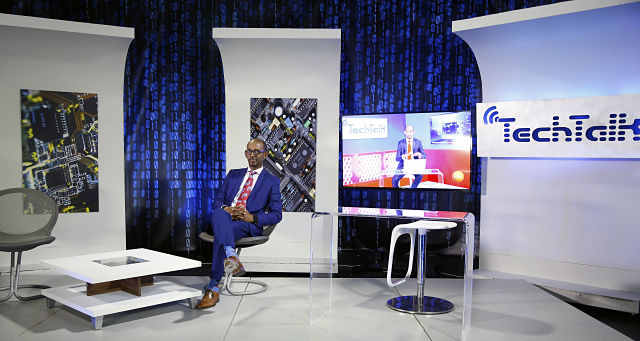 Solomon Mulugeta Kassa is the Producer and Host of the 'TechTalk with Solomon' television show on Ethiopia Broadcasting Services (EBS). (Courtesy photo)
Solomon Mulugeta Kassa is the Producer and Host of the 'TechTalk with Solomon' television show on Ethiopia Broadcasting Services (EBS). (Courtesy photo)
Tadias Magazine
By Tadias Staff
Published: May 8th, 2017
New York (TADIAS) — Long before Solomon Mulugeta Kassa launched his popular TechTalk televised show on Ethiopia Broadcasting Services (EBS) highlighting Ethiopian scientists, his friends used to tease him about his nonstop enthusiasm for the newest robot, space exploration, or digital gadgets. “I am always excited about the most recent human innovations in science and technology that impact our lives,” Solomon said in a recent interview with Tadias Magazine, noting that it was one of his buddies who suggested that he become a TV personality so he can free them from his constant obsession. “It was a jokester friend of mine who inspired me to do it,” Solomon recalled with laughter. “So I eventually contacted EBS and made a proposal for the show. They loved it. They said when can you start? That was in 2012.”
Fast forward five years later and Solomon — who works full time as a Senior Technology Consultant for Deloitte — has so far taped over 130 episodes of his show featuring fascinating guests including NASA scientist Dr. Brook Lakew, who is an Associate Director for Planning, Research and Development, Solar System Exploration Division at the U.S. National Aeronautics and Space Administration, as well as Ethiopian American scientist Sossina M. Haile who is Professor of Materials Science & Chemical Engineering at Northwestern University and one of the leading green energy researchers in the world.
Solomon said his only requirement for the show was that the DC-based program conducted interviews in Amharic so as to avoid “any language barrier” for his target audience especially in Ethiopia. “We know that even in this age of the Internet there is a huge information gap that exists in Ethiopia,” Solomon said. “That knowledge gap has always felt like a burden to me, so this is my way of sharing a little bit of what I know with people who are both younger, older and much smarter than I am.” Over the years Solomon has won an enthusiastic following both in Ethiopia and abroad. He has even appeared as a guest on various national Ethiopian TV shows, and last year received the SEED award from the US-based Society of Ethiopians Established in Diaspora.
SEED said they recognized Solomon for “his extraordinary commitment in promoting the use and teaching of technology through his “Tech Talk” initiative on EBS, reaching millions in the Ethiopian community and doing so in our native language.” And his alma mater, The George Washington University, where he received his Master of Science degree in Information Systems Technology Management in 2011, was equally enthusiastic in a recent feature on their website profiling their former student as trailblazer in the Ethiopian community. In his episodes, “Solomon interviews subject matter experts who enlighten viewers on recent science and technology developments, applications, and uncharted areas of exploration,” the university wrote. “The more than 100 weekly sessions have covered such diverse topics as robotics, space exploration, industrial design, transportation technology, construction engineering, aviation, and futuristic innovations.”

TechTalk with Solomon on EBS. (Courtesy photo)
Like many immigrants Solomon shared that adjusting to life in the United States wasn’t necessarily a smooth ride for him. “It was more like a roller coaster,” he said. “I arrived in Washington in late 2003 (on December 31st to be exact) on a scholarship to attend the University of Jamestown, a private liberal arts college, located in Jamestown, North Dakota.” Solomon, however, never made it past the D.C. area. “When I came here I had only $120 in my pocket,” he recalled. “The scholarship I had was not 100%. It covered about 65% of my expenses. So it became immediately clear to me that I had to find a way to support myself and get my papers straight in order to finish school.” That included crashing at a friend’s studio and working for a while at a convenience store “shelving beers and mopping the floor.” After a while he found a job at a hotel as a front desk supervisor from 3:00pm to 11:00pm, which he said allowed him to attend school during the day, starting at Northern Virginia Community College where he earned another technology associate degree (his first associate degree equivalency was from a private software engineering school in Ethiopia). He also briefly attended George Mason University, but had to withdraw because “working full time, supporting family and going to school was not working out.” At the end Solomon, who is a father of one, graduated from DC’s Strayer University with a Bachelor of Science degree in 2008. Soon he landed a new professional job as a software developer working at the American Society of Clinical Oncology for five years prior to continuing his graduate studies at George Washington University and moving on to join his current position at Deloitte in 2011. And less than a year later Tech-talk with Solomon’ was born on EBS.
In addition, Solomon announced that he is putting the final touches on an upcoming new book on science and technology, which he says is “the first Amharic publication of its kind both in content and detail. “It will cover major science moments in history, its effect on the world and its relations to Ethiopia from the industrial revolution to the information age.” Solomon says. “The book will also contain a reflection about the future. Where are we headed? And what is our role? I am talking here about Africans in general and Ethiopians in particular. The fact of the matter is that we started civilization, but when it comes to modern technology we are still playing catch up.”
Asked about the ongoing debate on social media about Ethiopia’s fledgling space program Solomon said he is not as skeptical as some people although he has his own cautious opinions about what the priorities of the orbiters should be such as to “improve agriculture or provide useful weather data as opposed to focusing solely on communication,” he said. “Actually right now technology is the only solution to leapfrog and address some of our most pressing issues.”
“For example in the 1990′s people used to mock our entire continent saying what good is the Internet for Africa?” Solomon emphasized. “Well, look where we are now. So it’s not a luxury. Why should we be the last adopters? Why?”
—
You can learn more about the show at www.techtalkwithsolomon.com.
Join the conversation on Twitter and Facebook.

























